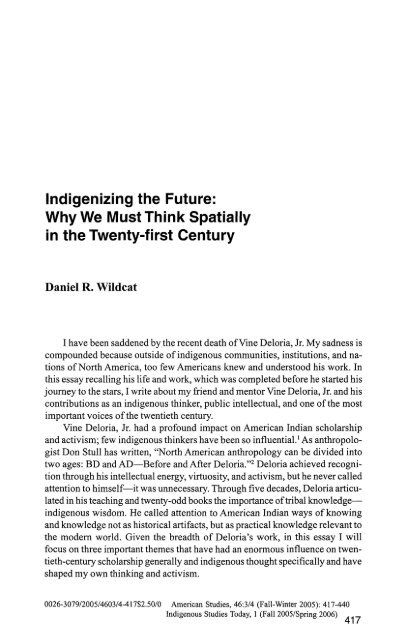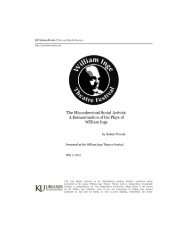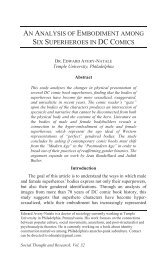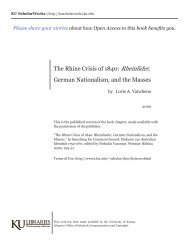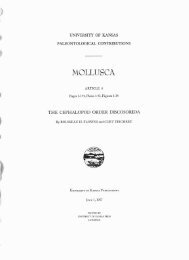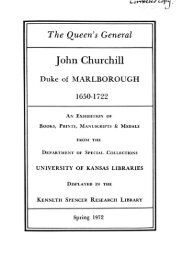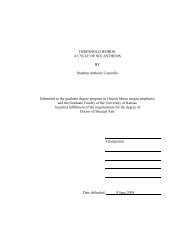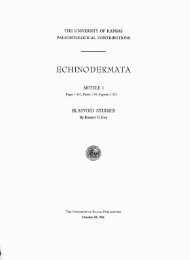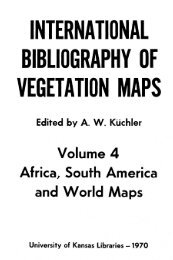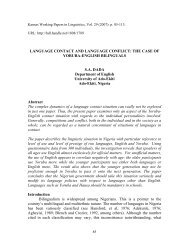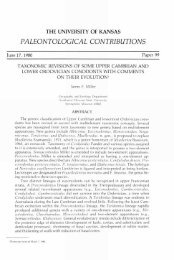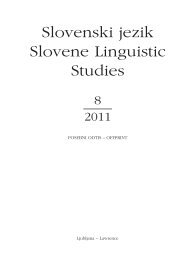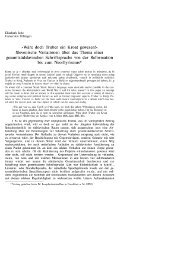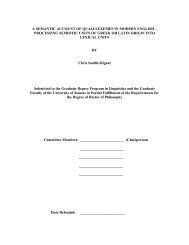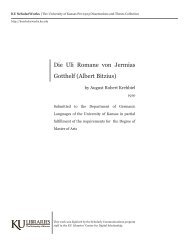Indigenizing the Future: Why We Must Think ... - KU ScholarWorks
Indigenizing the Future: Why We Must Think ... - KU ScholarWorks
Indigenizing the Future: Why We Must Think ... - KU ScholarWorks
You also want an ePaper? Increase the reach of your titles
YUMPU automatically turns print PDFs into web optimized ePapers that Google loves.
<strong>Indigenizing</strong> <strong>the</strong> <strong>Future</strong>:<br />
<strong>Why</strong> <strong>We</strong> <strong>Must</strong> <strong>Think</strong> Spatially<br />
in <strong>the</strong> Twenty-first Century<br />
Daniel R. Wildcat<br />
I have been saddened by <strong>the</strong> recent death of Vine Deloria, Jr. My sadness is<br />
compounded because outside of indigenous communities, institutions, and nations<br />
of North America, too few Americans knew and understood his work. In<br />
this essay recalling his life and work, which was completed before he started his<br />
journey to <strong>the</strong> stars, I write about my friend and mentor Vine Deloria, Jr. and his<br />
contributions as an indigenous thinker, public intellectual, and one of <strong>the</strong> most<br />
important voices of <strong>the</strong> twentieth century.<br />
Vine Deloria, Jr. had a profound impact on American Indian scholarship<br />
and activism; few indigenous thinkers have been so influential. 1 As anthropologist<br />
Don Stull has written, "North American anthropology can be divided into<br />
two ages: BD and AD—Before and After Deloria." 2 Deloria achieved recognition<br />
through his intellectual energy, virtuosity, and activism, but he never called<br />
attention to himself—it was unnecessary. Through five decades, Deloria articulated<br />
in his teaching and twenty-odd books <strong>the</strong> importance of tribal knowledge—<br />
indigenous wisdom. He called attention to American Indian ways of knowing<br />
and knowledge not as historical artifacts, but as practical knowledge relevant to<br />
<strong>the</strong> modern world. Given <strong>the</strong> breadth of Deloria's work, in this essay I will<br />
focus on three important <strong>the</strong>mes that have had an enormous influence on twentieth-century<br />
scholarship generally and indigenous thought specifically and have<br />
shaped my own thinking and activism.<br />
0026-3079/2005/4603/4-417S2.50/0 American Studies, 46:3/4 (Fall-Winter 2005): 417-440<br />
Indigenous Studies Today, 1 (Fall 2005/Spring 2006)
418 Daniel R. Wildcat<br />
First, Deloria always framed <strong>the</strong> topics he addressed in what I call <strong>the</strong> "big<br />
picture"—issues of world-wide importance. 3 Second, despite <strong>the</strong> nearly transcendent<br />
nature of his ideas, he always spoke as an indigenous thinker—a Standing<br />
Rock Sioux thinker, to be specific. On more than one occasion I heard him<br />
grouse about Indian professionals and scholars who contended that <strong>the</strong>ir tribal<br />
identity had not influenced <strong>the</strong>ir professional activities. He was always quick to<br />
ask, "<strong>Why</strong> not?" 4 He always took American Indian cultures—everything from<br />
habits and behavior to beliefs and values as well as material culture—seriously.<br />
Finally, among Deloria's most fruitful and challenging ideas is his four-decadesold<br />
proposal to consider history as a spatial phenomenon. 5<br />
Where Human Beings Are Today and <strong>the</strong> "Big Picture"<br />
The United States operates on incredibly stupid premises. It<br />
always fails to understand <strong>the</strong> nature of <strong>the</strong> world and so does<br />
not develop policies that can hold <strong>the</strong> allegiance of people. It<br />
<strong>the</strong>n alienates everyone who does not automatically love it. It<br />
worries about its reputation and prestige but daily becomes<br />
more vulnerable to ideologies more realistic than its own. This<br />
country could be easily influenced by any group with a more<br />
comprehensive philosophy of man if that group worked in a<br />
nonviolent, noncontroversial manner. 6<br />
Today leaders throughout <strong>the</strong> institutions of modern and postmodern societies<br />
desperately need modest indigenous maps of where public policy might<br />
presently move humankind—literally and figuratively. I suggest <strong>the</strong>y start with<br />
three early works by Vine Deloria, Jr.: Custer Died for Your Sins (1968), God Is<br />
Red (1973), and The Metaphysics of Modern Existence (1979). Contemplate<br />
three salient issues today: peace in <strong>the</strong> Middle East, economic growth in China,<br />
and <strong>the</strong> future of Russia. These issues have been profoundly shaped by <strong>the</strong> unique<br />
histories of <strong>the</strong>se places—<strong>the</strong>ir geographies, landscapes, ecological environments,<br />
and cultures. And in <strong>the</strong> early twenty-first century, war in Iraq, waged as<br />
a war against terrorism led by <strong>the</strong> United States, has dominated U.S. public<br />
concerns—as well it should. 7<br />
In a world dominated by increasingly global public policy issues, Deloria,<br />
a distinguished authority on American Indian affairs, has a lot to contribute. The<br />
strength of his writings is that <strong>the</strong>y always put American Indian struggles in <strong>the</strong><br />
big picture. From an analytic point of view, this meant that Deloria developed a<br />
keen understanding of American society's dominant—that is, predominantly<br />
<strong>We</strong>stern-informed—institutions and worldview. The problem of "history" is chief<br />
among <strong>the</strong> issues emerging from a world confronting <strong>We</strong>stern ideologies, and<br />
is, I argue, central to why we should give serious consideration to Vine Deloria's<br />
writings and <strong>the</strong> plausibility of indigenizing <strong>the</strong> future.
<strong>Indigenizing</strong> <strong>the</strong> <strong>Future</strong> 419<br />
The concept of indigenization has been profoundly influenced by Vine<br />
Deloria, Jr., and I take as its most defining feature <strong>the</strong> sense in which <strong>the</strong> word<br />
indigenous means being native to or of a place. 8 As people around <strong>the</strong> world are<br />
forced to, enticed to, or "freely" choose to adopt an increasingly homogenous<br />
commodity culture, what is lost are diverse local cultures situated in places,<br />
landscapes, and ecosystems <strong>the</strong>y call home. Indigenization is a set of practices<br />
that results in processes in which people seriously reexamine and adopt those<br />
particular and unique cultures that emerged from <strong>the</strong> places <strong>the</strong>y choose to live<br />
today. It is an acknowledgement that <strong>the</strong> old ways of living contain useful knowledge<br />
for our lives here and now.<br />
Unfortunately, Deloria's suggestion in God Is Red to reorient and<br />
reconceptualize history from a spatial perspective has not circulated widely. 9<br />
Few Americans consider Native Peoples as intellectuals. This prejudicial perspective,<br />
like so much of <strong>the</strong> dialogue between Indigenous People and European<br />
Americans in <strong>the</strong> United States, is fraught with irony. As Deloria's iconoclastic<br />
unmasking of <strong>the</strong> character of higher education in America demonstrates,<br />
America's academies seem increasingly to be institutions of fear and dogma—<br />
from both <strong>the</strong> ideological left and right.<br />
To <strong>the</strong> extent that <strong>the</strong> general public identifies intellectuals with <strong>the</strong> academy,<br />
we should be thankful that few Americans identify Indians with such institutions<br />
and generally ignore what academic intellectuals say. However, given<br />
anti-intellectual sentiment among many Americans, <strong>the</strong> downside for indigenous<br />
thinkers is that we are seldom heard, read, or examined by anyone o<strong>the</strong>r than<br />
those who "love" Indians in <strong>the</strong> most stereotypical fashion. If we diverge from<br />
ei<strong>the</strong>r <strong>the</strong> "noble savage" script or, conversely, <strong>the</strong> despondent dependent colonial<br />
victim motif, many Americans simply turn <strong>the</strong> channel or put <strong>the</strong> book<br />
down. That many people in addition to scholars, literati, social activists, and<br />
American Indians have read Vine Deloria's books indicates his influence. With<br />
American Indians comprising only about 1 percent of <strong>the</strong> population, one cannot<br />
become well-known by simply writing for American Indian readers. More<br />
to <strong>the</strong> point, if one wants to improve <strong>the</strong> position of Indigenous Americans,<br />
European American and African American allies are needed. Deloria understood<br />
this point and worked to build intellectual alliances, but from a position<br />
of strength, never from a position of weakness.<br />
That position of strength, for Deloria, was always American Indian metaphysics,<br />
or what I prefer to identify as worldviews. In The Metaphysics of Modern<br />
Existence, Deloria surveyed some of <strong>the</strong> most provocative thinkers of <strong>the</strong><br />
1960s and 1970s. He used Jean-Francois Revel's book Without Marx or Jesus<br />
as a point of departure to search for an integrated syn<strong>the</strong>sis of knowledge, both<br />
scientific and religious. 10 Given developments in <strong>the</strong> sciences throughout <strong>the</strong><br />
1960s and 1970s, Deloria was hopeful that a big picture might emerge:<br />
The problem is not. . . forcing people to delve into <strong>the</strong> sophisticated<br />
<strong>the</strong>ories of modern physics, astronomy, or psy-
420 Daniel R. Wildcat<br />
choanalysis. Ra<strong>the</strong>r <strong>the</strong> problem is that <strong>We</strong>stern peoples have<br />
stepped out of <strong>the</strong> mainstream of our species' traditional way<br />
of recording and remembering experiences. <strong>We</strong>stern thinkers<br />
have erected a series of absolute concepts, some dealing with<br />
<strong>the</strong> physical world, o<strong>the</strong>rs describing <strong>the</strong> world of human affairs.<br />
As a consequence, <strong>We</strong>stern people have been taught to<br />
think in a restricted manner. The whole development of modern<br />
science today would suggest that we are returning to <strong>the</strong><br />
ancient manner of thinking in which all <strong>the</strong> contents of experience<br />
are integrated in a single descriptive language. 11<br />
In Metaphysics Deloria discussed evidence supporting his hope that <strong>the</strong> old<br />
<strong>We</strong>stern notions of science and religion would give rise to a "new," integrated,<br />
experientially based sense of knowledge. He was not talking about a reductionists<br />
consilience, as advocated by E. O. Wilson. 12 Instead, Deloria had in mind a<br />
much more complex integration or consilience, one that operated on several<br />
levels of experience and throughout what might be called different spheres of<br />
life, without reducing <strong>the</strong> world to materialist mechanisms.<br />
Integration, according to Deloria, would not operate through physical mechanisms<br />
but ra<strong>the</strong>r through a "single descriptive language." 13 Of course, <strong>the</strong><br />
"ancient manner of thinking" 14 about experience has had little opportunity to<br />
develop given scientific practices today, which are even more specialized than<br />
three decades ago. In indigenous worldviews all things are related and connected;<br />
however, <strong>the</strong>y do not relate and connect through simple cause-andeffect<br />
mechanisms. Instead <strong>the</strong>y are understood through language and culture<br />
built on ancient observations of correspondences and juxtapositions of phenomenal<br />
events and situations. Deloria's methodological approach was informed<br />
by what I call a modest indigenous epistemological position: knowledge resides<br />
in <strong>the</strong> construction of meaning found in <strong>the</strong> process of living in <strong>the</strong> world. 15<br />
Deloria's indigenous epistemological position is intrinsically ecological in<br />
character. Knowledge from this indigenous position cannot exist as an exclusively<br />
human construction, but must be an emergent property of life systems<br />
and environments. Therefore, in our Native traditions, it is not romanticism to<br />
refer to mountains, plants, animals, rivers, and so forth, as our teachers or<br />
elders—it is realism. Three decades ago Deloria was keeping indigenous traditions<br />
of leadership alive when he implored readers to pay attention to <strong>the</strong> "peculiar<br />
genius of each continent—each river valley, <strong>the</strong> rugged mountains, <strong>the</strong> placid<br />
lakes," not merely to examine <strong>the</strong> obvious environmental problems, but more<br />
important, to find solutions. 16 A big-picture indigenous realism suggests "wisdom"<br />
does indeed "sit in places." When we set out today to address <strong>the</strong> pressing<br />
problems of <strong>the</strong> planet, it is crucial that <strong>the</strong> we includes <strong>the</strong> many o<strong>the</strong>r-thanhuman<br />
entities who are also members of and critical to our communities.<br />
Deloria's work has, unfortunately, been neglected. This is best illustrated<br />
by Deloria's mostly unknown, The Metaphysics of Modern Existence. The dis-
<strong>Indigenizing</strong> <strong>the</strong> <strong>Future</strong> 421<br />
mal reception of this work can be largely explained by <strong>the</strong> publisher's view that<br />
<strong>the</strong> general U.S. reading public, although finding it plausible to think an American<br />
Indian might have something insightful to say about Indian affairs and Indian-white<br />
relations, finds it nearly impossible to believe a Sioux Indian could<br />
have anything intelligent or useful to say about modern non-Indian society, especially<br />
its science, metaphysics, and religion. 17<br />
Deloria's Metaphysics seems to challenge stereotypes of Indians; "real"<br />
Indians are not supposed to know Judeo-Christian <strong>the</strong>ology, <strong>We</strong>stern philosophy,<br />
and European American law. Thus, many Americans expect Indians to be<br />
angry, but when Deloria systematically called into question <strong>the</strong> internal coherence,<br />
assumptions, and practical consequences of <strong>We</strong>stern civilization, many<br />
were intrigued but unable to appreciate fully his indigenous assessments of<br />
America and <strong>the</strong> metaphysics of modern existence.<br />
Fortunately, American Indians have increasingly examined Deloria's discussion<br />
of North American intellectual traditions, including both his critique of<br />
dominant <strong>We</strong>stern thinking and its consequences and his elaboration upon and<br />
extension of American Indian conceptual frameworks. Herein lies his most significant<br />
contributions on a host of issues. Deloria's thinking provocatively engages<br />
a wide range of issues such as science, indigenous sovereignty, <strong>the</strong>ology,<br />
philosophy, and <strong>the</strong> environment. The power of his thought results in large part<br />
from his epistemological openness to nonlinear—for example, catastrophic and<br />
complex—events and explanations, which challenges those who want certainty<br />
in <strong>the</strong> world.<br />
Not surprisingly Deloria's recent work, Evolution, Creationism, and O<strong>the</strong>r<br />
Modern Myths, convincingly argues that <strong>the</strong> problem with <strong>the</strong> evolution-creationism<br />
debate is that both sides are adamant about having <strong>the</strong> "truth." Deloria<br />
pointed out that both sides arrive at <strong>the</strong>ir respective "truths" through two mutually<br />
exclusive abstract and closed systems of thought: "The quarrel between<br />
evolutionists and creationists, and between <strong>We</strong>stern and o<strong>the</strong>r religious traditions,<br />
reduced to its most basic form involves <strong>the</strong> interpretation of history. Two<br />
views, irreconcilable with each o<strong>the</strong>r, vie for our approval." 18 As systems of<br />
thought, science and religion have virtually no meeting ground since <strong>the</strong> common<br />
ground of experience, "<strong>the</strong> contents" of our experience, are never really<br />
examined. If experiences were examined, both sides would be much more modest<br />
in <strong>the</strong>ir claims and would resort less to what Deloria and Paul Feyerabend<br />
rightly identify as arguments by authority.<br />
<strong>We</strong> have relied on authority figures in both science and religion,<br />
and <strong>the</strong>y have brought us to this impasse. <strong>We</strong> are expected<br />
to choose sides between two antagonists, nei<strong>the</strong>r of<br />
whom offers us an accurate and verifiable set of beliefs to<br />
follow The anomalies in <strong>We</strong>stern science and religion are<br />
so numerous that <strong>the</strong>y now constitute an easily identifiable<br />
alternative to what we are presently asked to believe. <strong>We</strong>
422 Daniel R. Wildcat<br />
should demand that we be treated as adults—no more "Just<br />
So Stories" or religious myths need to be fed to us. 19<br />
The "Just So Stories" of <strong>We</strong>stern scientific and religious institutions are<br />
problematic unless one recognizes that what Calvin Martin called <strong>the</strong> "ontology<br />
of fear" has been deeply embedded in <strong>the</strong> <strong>We</strong>stern worldview and <strong>the</strong> personalities<br />
it produces. 20 As Deloria pointed out in God Is Red, <strong>the</strong> presence of fear is<br />
palpable in <strong>the</strong> main currents of Christianity.<br />
Deloria's and Martin's identification of fear as a prominent feature of modern<br />
<strong>We</strong>stern thinking is supported by Kirkpatrick Sale's examination of <strong>the</strong><br />
process of colonial conquest in The Conquest of Paradise. 21 Sale convincingly<br />
documented that <strong>the</strong> real tragedy of 1492 occurred before <strong>the</strong> voyage even began.<br />
Columbus and his learned European contemporaries were imbued with a<br />
fear of nature and <strong>the</strong> "natives" who lived in nature, outside <strong>the</strong> walls of <strong>the</strong> city.<br />
The way to overcome this fear was through control: control of nature and, of<br />
course, of <strong>the</strong> natives <strong>the</strong>mselves. The great civilizing—that is—colonizing,<br />
process of <strong>the</strong> <strong>We</strong>st had been well underway in Europe for several centuries<br />
before Cristobal Colon ever set sail. One need only examine <strong>the</strong> demonization<br />
and persecution of earth-based religions in <strong>the</strong> several centuries before Colon's<br />
journey to sense how Christian religious leaders instilled a fear of those who<br />
lived and prayed outside <strong>the</strong> city walls, beyond "civilization."<br />
The existence of an ontology of fear goes a long way toward explaining<br />
what Michel Foucault and a host of postmodernist <strong>the</strong>orists have identified as<br />
<strong>the</strong> modern linkage between control and knowledge and, later, <strong>the</strong> identification<br />
of technique or science with control and, <strong>the</strong>refore, <strong>the</strong> necessity for "authorities."<br />
22<br />
Truth as it is represented in <strong>the</strong> largely <strong>We</strong>stern debate between science and<br />
religion is about what John Dewey called <strong>the</strong> "quest for certainty." 23 Although<br />
Deloria and Dewey might disagree on several philosophical issues, when it comes<br />
to <strong>the</strong> crippling legacy of <strong>the</strong> quest for certainty, both seem to agree that equating<br />
knowledge with truth or certainty is a largely unattainable goal in a dynamic<br />
and rapidly changing world. The <strong>We</strong>stern trilogy of fear, control, and certainty<br />
does, it seems to me, sharply differ from indigenous North American worldviews,<br />
in which respect, cooperation, and choice dominate over fear, control, and certainty.<br />
Of course, such a perspective challenges <strong>We</strong>stern social science models<br />
that assume tribal societies are dominated by customs, habits, and superstitions<br />
that preclude choice. The towers of control and certainty in <strong>We</strong>stern thought<br />
appear in indigenous traditions more like tenuous bridges between different<br />
situations in space and time.<br />
Indigenous thinkers not only acknowledge contingency and human's lack<br />
of control in <strong>the</strong> world; <strong>the</strong>y also see it as empowering and humbling, not something<br />
frightening. In a vast number of indigenous worldviews, power exists in<br />
and through <strong>the</strong> relations and processes that constitute life. That <strong>the</strong> universe
<strong>Indigenizing</strong> <strong>the</strong> <strong>Future</strong> 423<br />
does not revolve around humans encourages an attentiveness to <strong>the</strong> world often<br />
neglected today. In <strong>the</strong> place of all of <strong>the</strong> post-Enlightenment -isms of <strong>We</strong>stern<br />
Civilization—for example, romanticism, modernism, postmodernism, and so<br />
forth—Deloria suggested we take seriously big pictures of <strong>the</strong> world in which<br />
our human choices are highlighted not by control but by cooperation. The question<br />
of informed choice is critical because, as he so eloquently summarized<br />
three decades ago, modern civilized human beings are ill informed because of<br />
<strong>the</strong>ir inattentiveness:<br />
The lands of <strong>the</strong> planet call to humankind for redemption.<br />
But it is a redemption of sanity, not a supernatural reclamation<br />
project at <strong>the</strong> end of history. The planet itself calls to <strong>the</strong><br />
o<strong>the</strong>r living species for relief. Religion cannot be kept within<br />
<strong>the</strong> bounds of sermons and scriptures. It is a force in and of<br />
itself and it calls for <strong>the</strong> integration of lands and peoples in<br />
harmonious reality. The lands wait for those who can discern<br />
<strong>the</strong>ir rhythms. The peculiar genius of each continent—each<br />
river valley, <strong>the</strong> rugged mountains, <strong>the</strong> placid lakes—all call<br />
for relief from <strong>the</strong> constant burden of exploitation.<br />
The future of humankind lies waiting for those who will<br />
come to understand <strong>the</strong>ir lives and take up responsibilities to<br />
all living things. Who will listen to <strong>the</strong> trees, <strong>the</strong> animals and<br />
birds, <strong>the</strong> voices of <strong>the</strong> places of <strong>the</strong> land? As <strong>the</strong> long-forgotten<br />
peoples of respective continents rise and begin to reclaim<br />
<strong>the</strong>ir ancient heritage, <strong>the</strong>y will discover <strong>the</strong> meaning<br />
of <strong>the</strong> land of <strong>the</strong>ir ancestors. That is when <strong>the</strong> invaders of <strong>the</strong><br />
North American continent will finally discover that for this<br />
land, God is red. 24<br />
The big picture in indigenous thinking is informed by <strong>the</strong> lands, by o<strong>the</strong>r<br />
living species (<strong>the</strong> trees, <strong>the</strong> animals, and <strong>the</strong> birds), and by <strong>the</strong> unique ecological<br />
and environmental features of <strong>the</strong> continents; in short, <strong>the</strong> custom of<br />
"viewing life in its totality" informs indigenous thinking. It means that <strong>the</strong> distinctions<br />
we make and <strong>the</strong> categories we form function very differently from<br />
those found in modern <strong>We</strong>stern civilization.<br />
For thousands of years indigenous pedagogy existed in "<strong>the</strong> traditions, beliefs,<br />
and customs of <strong>the</strong> American Indian people"—peoples who discerned <strong>the</strong><br />
rhythms of <strong>the</strong> lands and sought out <strong>the</strong> meanings found in places. It was hardly<br />
romanticism; it was merely experiential knowledges always suggesting ways<br />
human beings might integrate in harmonious realities that tribal peoples called<br />
home. No doubt mistakes were made, and tribal peoples have not always everywhere<br />
been attentive, but even here we have our own stories about <strong>the</strong> devastating<br />
consequences of inattentiveness.
424 Daniel R. Wildcat<br />
But, as Deloria so clearly articulated in God Is Red and o<strong>the</strong>r works, our<br />
indigenous mythologies seldom went <strong>the</strong> direction of <strong>We</strong>stern mythology, in<br />
which humankind becomes <strong>the</strong> creator and earth <strong>the</strong>ir resource. Deloria expressed<br />
an indigenous stance toward science and religion:<br />
If we compare religious experiences with scientific thinking,<br />
we arrive at <strong>the</strong> realization that <strong>the</strong> processes are much <strong>the</strong><br />
same; we should not laud <strong>the</strong> "objectivity" of <strong>the</strong> scientists<br />
while deriding <strong>the</strong> "subjectivity" of <strong>the</strong> religious thinkers.<br />
Physicists and many o<strong>the</strong>r scientists receive <strong>the</strong>ir insights in<br />
pretty much <strong>the</strong> same way that mystics and tribal medicine<br />
men do. 25<br />
Looking at our own "religious" traditions and <strong>the</strong>n looking at <strong>the</strong> traditions<br />
of science, Deloria saw possibilities for meaningful integration or, at least, respectful<br />
dialogue. He always insisted that <strong>the</strong>re is ano<strong>the</strong>r way—a Native way.<br />
Those wishing to escape <strong>the</strong> invidious dualisms, distinctions, and dichotomies<br />
of <strong>We</strong>stern thinking would do well to examine Deloria's work.<br />
Deloria's work has been influential for at least three generations of American<br />
Indian readers for several reasons. First, as suggested above, his discussion<br />
of issues was always framed in <strong>the</strong> big picture of human experience and comparative<br />
worldviews. Deloria understood that <strong>the</strong> problems Indians have faced<br />
in America cannot be analyzed independently from <strong>We</strong>stern institutions. Second,<br />
his analyses were always couched in terms of American Indian points of<br />
view or, as I will suggest, knowledges. Finally, few indigenous scholars have so<br />
clearly identified a fundamental and paradigm-shifting idea in indigenous North<br />
American worldviews as Deloria did in his elaboration of American Indian "spatial<br />
thinking" and a spatial conception of history.<br />
Deloria saw little opportunity or reward in mainstream academia for "syn<strong>the</strong>sizers—those<br />
who try to paint <strong>the</strong> larger picture" of life and knowledge in<br />
<strong>the</strong> world:<br />
Unfortunately, at <strong>the</strong> present time academics seem to be rewarded<br />
with advancement primarily when <strong>the</strong>y keep <strong>the</strong> knowledge<br />
of <strong>the</strong> past grounded in narrowly focused specialty topics,<br />
<strong>the</strong>reby gaining an immense reputation by becoming an<br />
expert in a miniscule field defined exclusively by <strong>the</strong>mselves<br />
and <strong>the</strong>ir colleagues. Syn<strong>the</strong>sizers—those who try to paint <strong>the</strong><br />
larger picture—do not do well in academia, and for that reason<br />
most of <strong>the</strong> truly creative work is being done outside <strong>the</strong><br />
ivy covered walls. 26
<strong>Indigenizing</strong> <strong>the</strong> <strong>Future</strong> 425<br />
Never<strong>the</strong>less, Deloria continued to encourage new generations of American<br />
Indian scholars to form <strong>the</strong>ir own institutions of education and to do so by<br />
taking American Indian knowledges seriously.<br />
Taking American Indian Knowledges Seriously<br />
<strong>We</strong> stand today at a crossroads. . . . Clearly <strong>the</strong> current tendency<br />
is to attempt to reclaim <strong>the</strong> nineteenth-century roots of<br />
social existence that can give us a sense of permanency in a<br />
world of increasing change. But <strong>the</strong> stability of that era was at<br />
best a mythological memory of a golden age. Our very refusal<br />
to acknowledge <strong>the</strong> failures of both American and world history<br />
and our patriotic effort to make it into a golden age show<br />
how pa<strong>the</strong>tic and inadequate our tools for confronting change<br />
really are.<br />
Within <strong>the</strong> traditions, beliefs, and customs of <strong>the</strong> American<br />
Indian people are <strong>the</strong> guidelines for society's future. . ..<br />
White America and <strong>We</strong>stern industrial societies have not heard<br />
<strong>the</strong> call of ei<strong>the</strong>r <strong>the</strong> lands or <strong>the</strong> aboriginal peoples. In appalling<br />
indices of social disorder of <strong>the</strong> tribal peoples <strong>We</strong>sterners<br />
see only continued disruption and, being unaccustomed<br />
to viewing life as a totality, cannot understand <strong>the</strong> persistence<br />
of <strong>the</strong> tribal peoples in preserving <strong>the</strong>ir communities, lands<br />
and religions. 27<br />
Ano<strong>the</strong>r distinguishing feature of Vine Deloria, Jr.'s books, essays, and articles<br />
is that, unlike many Indian experts writing about Indians in <strong>the</strong> 1960s and 1970s,<br />
Deloria took American Indian knowledges seriously. He did not view Indian<br />
knowledge systems in <strong>the</strong> past tense as artifacts or relics that must be preserved<br />
for history's sake, but ra<strong>the</strong>r as knowledges that should be taken seriously for<br />
contemporary and practical purposes.<br />
I have heard Vine Deloria tell numerous audiences that when he became<br />
executive director of <strong>the</strong> National Congress of American Indians he always made<br />
it a point to listen to what <strong>the</strong> elders of tribal communities had to say. 28 He<br />
gained a tremendous amount of information by listening—not only when <strong>the</strong>se<br />
elders spoke to critical contemporary issues of <strong>the</strong> day, but also when <strong>the</strong>y spoke<br />
informally of <strong>the</strong>ir childhoods. He learned from <strong>the</strong>ir stories, information, and<br />
<strong>the</strong> knowledge <strong>the</strong>y had gained from <strong>the</strong>ir parents and grandparents living before<br />
and in <strong>the</strong> early days of reservation life.<br />
Deloria treated American Indian knowledges as wisdom, as living entities.<br />
As a result he influenced two generations of indigenous scholars who would not<br />
be trapped in <strong>the</strong> dominant <strong>We</strong>stern dichotomy of ei<strong>the</strong>r/or in any of its pernicious<br />
forms: primitive versus modern, spiritual versus physical, nature versus<br />
culture, and so on. He was an "indigenist" before <strong>the</strong> term became popularly<br />
applied to Native-based thinking and actions. 29
426 Daniel R. Wildcat<br />
In Custer Died for Your Sins, Deloria suggested that what was needed were<br />
American Indian intellectuals who could fight <strong>the</strong> battles of self-determination<br />
intellectually on <strong>the</strong> battlegrounds of <strong>the</strong> dominant society. Yet <strong>the</strong>y would use<br />
<strong>the</strong>ir own indigenous intellectual weapons to "greatly influence <strong>the</strong> thinking of<br />
<strong>the</strong> nation within a few years."<br />
It would be fairly easy, however, with a sufficient number of<br />
articulate young Indians and well-organized community support,<br />
to greatly influence <strong>the</strong> thinking of <strong>the</strong> nation within a<br />
few years.<br />
So it is vitally important that <strong>the</strong> Indian people pick <strong>the</strong><br />
intellectual arena as <strong>the</strong> one in which to wage war. Past events<br />
have shown that <strong>the</strong> Indian people have always been fooled<br />
by <strong>the</strong> intentions of <strong>the</strong> white man. Always we have discussed<br />
irrelevant issues while he has taken <strong>the</strong> land. Never have we<br />
taken <strong>the</strong> time to examine <strong>the</strong> premises upon which he operates<br />
so that we could manipulate him as he has us.<br />
A redefinition of Indian Affairs, <strong>the</strong>n, would concentrate<br />
its attention on <strong>the</strong> coordination among <strong>the</strong> non-reservation<br />
peoples and <strong>the</strong> reservation on a regional or area basis. In that<br />
way migrations to and from urban areas could be taken into<br />
account when planning reservation programs. 30<br />
There are several reasons developments in Indian Country have not unfolded<br />
exactly as Deloria suggested in 1969. For example, <strong>the</strong> modern corporate<br />
structures that he hoped might serve as vehicles for an Indian recolonization<br />
of <strong>the</strong> land may ra<strong>the</strong>r have precluded effective tribal innovations. His hope was<br />
that once Indians adopted corporate structures to accomplish a wide range of<br />
goals, <strong>the</strong>y would adapt <strong>the</strong>se structures to fit <strong>the</strong>ir own worldviews. Some success<br />
has certainly been met by <strong>the</strong> efforts of several tribes in <strong>the</strong> Great Plains to<br />
reclaim land and to reintroduce (recolonize) <strong>the</strong> bison or American buffalo into<br />
that environment. More widespread and less certain in <strong>the</strong> big picture of future<br />
tribal economies and cultures are <strong>the</strong> numbers of tribal corporations developing<br />
around casino-style gaming.<br />
In challenging <strong>the</strong> status quo, Deloria surprised Indians and non-Indians<br />
alike by picking metaphysics as an intellectual arena in which to battle. Imagine<br />
<strong>the</strong> reaction of <strong>the</strong> non-Native readers who found an American Indian confidently<br />
articulating Indian solutions to modern social problems—and identifying<br />
<strong>the</strong> solutions based on American Indian traditions and worldviews.<br />
During <strong>the</strong> 1960s and early 1970s <strong>the</strong>mes of love were common in American<br />
popular music; singers and songwriters suggested love as <strong>the</strong> answer to<br />
humankind's most pressing social problems. However, beyond Billboard's top<br />
40 lists few Americans, especially intellectuals, took popular music's love solu-
<strong>Indigenizing</strong> <strong>the</strong> <strong>Future</strong> 427<br />
tions seriously, nor were <strong>the</strong>y willing to reassess <strong>the</strong> modern <strong>We</strong>stern worldview,<br />
which was producing serious distortion in <strong>the</strong> world. Deloria was an exception.<br />
Of course, <strong>the</strong> hippies, yippies, and many youth of <strong>the</strong> era saw <strong>the</strong> problems<br />
and desperately sought solutions outside <strong>the</strong> dominant materialist and militarily<br />
reinforced conventions of America. Buddhism, self-help psychologies by <strong>the</strong><br />
dozen, Jesus Freaks, and all manner of counterculture movements, groups, and<br />
sects were afoot. Never<strong>the</strong>less, intellectuals in <strong>the</strong> United States during this<br />
time continued for <strong>the</strong> most part to labor within <strong>the</strong> confines of <strong>We</strong>stern<br />
worldviews and philosophies. This is not to deny that some were doing very<br />
good work in identifying problem areas: democracy, <strong>the</strong> environment, religion,<br />
and applications of science to technology. But, I shall argue, following Deloria's<br />
formulations at <strong>the</strong> time, that <strong>the</strong> problems were and remain inextricably bound<br />
up in <strong>the</strong> <strong>We</strong>stern worldview.<br />
As <strong>the</strong> institutions of science, politics, economics, and, of course, religion<br />
in America were all discovering <strong>the</strong> "environment" in <strong>the</strong> early 1970s, Deloria<br />
was pointing out that American Indians had long-standing human cultures (and<br />
I mean culture in <strong>the</strong> big picture—all of those features of our humanity that<br />
involve creativity and choice) and, specifically, worldviews built on what I would<br />
call an ecological foundation. In <strong>We</strong> Talk, You Listen Deloria described <strong>the</strong> artificiality<br />
of modern American ways of living in both rural and urban areas. He<br />
described with great vision what an increasing number of Americans now realize<br />
as we begin <strong>the</strong> twenty-first century:<br />
Technological progress totally defines <strong>the</strong> outlook of most<br />
of America, so long as newer buildings and fancier roads can<br />
be built, additional lighting and electrical appliances can be<br />
sold, and conveniences for modern living can be created <strong>the</strong>re<br />
is not <strong>the</strong> slightest indication that urban man realizes that his<br />
artificial universe is dependent on <strong>the</strong> real world. 31 (emphasis<br />
mine)<br />
The "artificial universe" Deloria described three decades ago is so prominent<br />
today that many children think of trips to <strong>the</strong>me parks as outdoor adventures,<br />
and skyscraper metropolitan hotels create several-stories-high lobbies with<br />
waterfalls, lagoons, and tropical plants to give guests a calming environment<br />
and, above all else, a convenient and completely artificial sense of nature. Deloria<br />
saw no evidence that <strong>the</strong> dominant ideas of America could be reoriented to<br />
achieve a worldview that would hold some hope for a sustainable future for<br />
humans and o<strong>the</strong>r species on <strong>the</strong> planet. 32 Modern industrial, and now<br />
postindustrial, technology has so isolated us from plants, animals, and <strong>the</strong> socalled<br />
natural elements that it is amazing we have any "nature" and "natives"<br />
left anywhere on <strong>the</strong> planet.<br />
The alienation from indigenous tribal identities, worldviews, and knowledges<br />
is marked by matriculation into what Deloria called an "artificial universe." 33
428 Daniel R. Wildcat<br />
Considered collectively, Deloria's work has suggested what it means to indigenize<br />
American Indian policies and programs. There is much good work to be done:<br />
we must both extract ourselves from a culture dominated by Eurocentric colonial<br />
policies and institutions that are called American Indian only because that<br />
is to whom <strong>the</strong> policies and programs are directed, and also create communities<br />
where educational policies and institutions are denominated Indigenous because<br />
<strong>the</strong>y have emerged from our tribal cultures.<br />
In <strong>the</strong> place of corporate plans for an America and a planet increasingly<br />
"mailed" and characterized by a homogeneous commodity culture disconnected<br />
from unique peoples and places, Deloria suggested <strong>the</strong> feasibility of an indigenous<br />
map to <strong>the</strong> summum bonum. Long before <strong>the</strong> term globalization became<br />
popular, Deloria saw American society exporting destruction. He saw solutions<br />
in tribal worldviews:<br />
Meanwhile, American society could save itself by listening to<br />
tribal people. While this would take a radical reorientation of<br />
concepts and values, it would be well worth <strong>the</strong> effort. The<br />
land-use philosophy of Indians is so utterly simple that it seems<br />
stupid to repeat it: man must live with o<strong>the</strong>r forms of life on<br />
<strong>the</strong> land and not destroy it. The implications of this philosophy<br />
are very far-reaching for <strong>the</strong> contemporary political and<br />
economic system. 34 (emphasis mine)<br />
Deloria concluded his discussion of our new "artificial universe" with an<br />
admonition: "The only answer will be to adopt Indian ways to survive. For <strong>the</strong><br />
white man even to exist, he must adopt a total Indian way of life." 35 Our indigenous<br />
ancestors were not ecologists or environmentalists as we think of <strong>the</strong>m<br />
today—<strong>the</strong>y simply lived and thought ecologically and environmentally. In<br />
American Indian traditions, <strong>the</strong>re is no tension and opposition between philosophy<br />
and how one lives.<br />
Not surprisingly, in a review of Paul Feyerabend's works on <strong>We</strong>stern scientific<br />
methodology and epistemology, 36 Deloria began his essay by quoting <strong>the</strong><br />
words of Osage Chief Big Soldier to Indian Agent George Sibley in 1920:<br />
I see and admire your manner of living, your good warm<br />
houses: your extensive fields of corn,.. . workhouses, and a<br />
thousand machines, that I know not <strong>the</strong> use of. . . . In short<br />
you can do almost what you choose. You whites possess <strong>the</strong><br />
power of subduing almost every animal to your use. You are<br />
surrounded by slaves. Everything about you is in chains and<br />
you are slaves yourselves. I fear if I should exchange my pursuits<br />
for yours, I too should become a slave. 37
<strong>Indigenizing</strong> <strong>the</strong> <strong>Future</strong> 429<br />
The quote is not token "nativism"; ra<strong>the</strong>r it indicates <strong>the</strong> extent to which<br />
Deloria, regardless of <strong>the</strong> topic under scrutiny, finds wisdom in <strong>the</strong> words of<br />
indigenous peoples who, only one or two centuries ago, were viewed as primitive.<br />
In Against Method, Feyerabend identified <strong>the</strong> inconsistencies between orthodox<br />
scientific methodology and epistemology and pointed out that alternative<br />
approaches to knowledge are epistemologically precluded. Deloria was<br />
correct to see Feyerabend as an ally on <strong>the</strong> battleground of scientific mythologies,<br />
especially in his advocacy of maturity when determining <strong>the</strong> value of<br />
special forms of knowledge "to <strong>the</strong> totality of human existence." 38 Deloria<br />
elaborated a definite indigenous notion of maturity that drew on his years of<br />
attentiveness to indigenous North American elders or, dare I say, scholars:<br />
Maturity, in <strong>the</strong> American Indian context, is <strong>the</strong> ultimate goal<br />
of all human existence. Here we have a good many similarities<br />
with Feyerabend's conception of mature understanding.<br />
.. . Maturity, in <strong>the</strong> American Indian context, is <strong>the</strong><br />
ability to reflect on <strong>the</strong> ordinary things of life and discover<br />
both <strong>the</strong>ir real meaning and <strong>the</strong> proper way to understand <strong>the</strong>m<br />
when <strong>the</strong>y appear in our lives. This idea sounds as abstract as<br />
anything uttered by a <strong>We</strong>stern scientist but it is not abstract in<br />
<strong>the</strong> Indian context. 39<br />
In an American society fixated on youth, Deloria's work may point out as<br />
well as anyone's <strong>the</strong> value of paying attention.<br />
Maturity is a reflective state suggesting a lifetime of experiences that, through<br />
an increasing ability to reflect on experience, has produced a personal hierarchy<br />
of relationships. This hierarchy has three major components that, because of <strong>the</strong><br />
intensely personal nature of experience, are appropriately related to <strong>the</strong> experiences<br />
of <strong>the</strong> individual and, on <strong>the</strong> tribal level, <strong>the</strong> group. Maturity seems to be<br />
essentially about attentiveness: <strong>the</strong> development of what I have called a "syn<strong>the</strong>tic<br />
attentiveness" to <strong>the</strong> web of complex relationships that constitute our<br />
experience.<br />
Deloria's suggestion that maturity is best found in those societies and traditions<br />
that scholars have labeled as "primitive" is explored in considerable depth<br />
in The Metaphysics of Modern Existence. In a chapter entitled "Tribal Religious<br />
Realities," he once again found intellectual enrichment in <strong>the</strong> perceptions<br />
of reality held by so-called "primitive" people:<br />
<strong>We</strong> conclude that primitive peoples' perceptions of reality,<br />
particularly <strong>the</strong>ir religious experiences and awareness of divinity,<br />
occupy a far different place in <strong>the</strong>ir lives than do <strong>the</strong><br />
conceptions of <strong>the</strong> world religions, <strong>the</strong>ir experiences, and <strong>the</strong>-
430 Daniel R. Wildcat<br />
ologies, philosophies, doctrines, dogmas, and creeds. Primitive<br />
peoples preserve <strong>the</strong>ir experiences fairly intact, understand<br />
<strong>the</strong>m as a manifestation of <strong>the</strong> unity of <strong>the</strong> natural world,<br />
and are content to recognize <strong>the</strong>se experiences as <strong>the</strong> baseline<br />
of reality Primitive peoples always have a concrete reference—<strong>the</strong><br />
natural world—and <strong>the</strong> adherents of <strong>the</strong> world religions<br />
continually deal with abstract and ideal situations on<br />
an intellectual plane. "Who is my neighbor?" becomes a question<br />
of great debate in <strong>the</strong> tradition of <strong>the</strong> world religions, and<br />
<strong>the</strong> face of <strong>the</strong> neighbor changes continually as new data about<br />
people becomes available. Such a question is not even within<br />
<strong>the</strong> world view of primitives. They know precisely who <strong>the</strong>ir<br />
relatives are and what <strong>the</strong>ir responsibilities toward <strong>the</strong>m entail.<br />
40<br />
Deloria emphasized that if we were to take seriously <strong>the</strong> knowledges and<br />
wisdom possessed by tribal peoples we might find something useful for understanding<br />
<strong>the</strong> crises modern humans face daily: "abandonment, despair and anguish,"<br />
to borrow an apt description from Sartre. 41 <strong>We</strong> need not try to go back to<br />
<strong>the</strong> "good oP days" or become "natives." A good place to begin this muchneeded<br />
honest assessment of tribal knowledges is a consideration of what would<br />
happen if human beings once again took <strong>the</strong> places—<strong>the</strong> spatial dimension—<br />
where we lived as being as constitutive of our histories as time or <strong>the</strong> temporal<br />
dimension. What American Indians, indigenous people worldwide, and a growing<br />
number of non-Native peoples now recognize is that we have an opportunity<br />
historically and culturally to assess <strong>the</strong> wisdom held by tribal peoples before<br />
<strong>the</strong> onslaught of industrially dominated nation-states.<br />
<strong>Think</strong>ing Spatially:<br />
What It Means and <strong>Why</strong> It Is Important<br />
When <strong>the</strong> domestic ideology is divided according to American<br />
Indians and <strong>We</strong>stern European immigrants, however, <strong>the</strong><br />
fundamental difference is one of great philosophical importance.<br />
American Indians hold <strong>the</strong>ir lands—places—as having<br />
<strong>the</strong> highest possible meaning, and all <strong>the</strong>ir statements<br />
are made with this reference point in mind. Immigrants review<br />
<strong>the</strong> movement of <strong>the</strong>ir ancestors across <strong>the</strong> continent as<br />
a steady progression of basically good events and experiences,<br />
<strong>the</strong>reby placing history-time in <strong>the</strong> best possible light, (my<br />
emphasis) 42<br />
Throughout his writing, Deloria articulated an indigenous philosophical<br />
foundation for <strong>the</strong> unique expression of different tribal identities: a foundation
<strong>Indigenizing</strong> <strong>the</strong> <strong>Future</strong> 431<br />
fundamentally spatial in character. His years of experience working with indigenous<br />
people throughout <strong>the</strong> United States led him to recognize <strong>the</strong> cultural<br />
uniqueness of specific peoples from particular places on <strong>the</strong> planet. His formulation<br />
of spatial thinking, which counts as <strong>the</strong> metaphysical antidote to <strong>the</strong> abstractions<br />
and mythologies of <strong>We</strong>stern views of history, necessarily emphasizes<br />
experience. In spite of <strong>the</strong> homogenizing cultural influence of globalization,<br />
one must approach <strong>the</strong> world as landscapes identifiable with "a series of nonhomogeneous<br />
pockets of identity that must be thrust into eventual conflict, because<br />
<strong>the</strong>y represent different arrangements of emotional energy." 43 Today we<br />
are living through <strong>the</strong> "eventual conflict" that three decades ago Deloria anticipated<br />
would take a primarily religious form, for example, <strong>the</strong> Middle East and<br />
central Asia. His sustained use of spatial thinking is important to explicate. 44<br />
At <strong>the</strong> beginning of <strong>the</strong> twenty-first century—as <strong>We</strong>stern chronology would<br />
denominate <strong>the</strong> "time" we live in—increasing numbers of scholars, policy makers,<br />
and <strong>the</strong> general public around <strong>the</strong> world are beginning to recognize that <strong>the</strong><br />
exclusively <strong>We</strong>stern notions of historical progress, civilization, and enlightenment<br />
are not so simple nor so innocent as once believed. Deloria's repeated<br />
radical critique of <strong>We</strong>stern conceptions of history presently eclipses rediscoveries<br />
and reassertions of <strong>the</strong> importance of spatial concepts and realities found throughout<br />
French postmodernist <strong>the</strong>ories and discourses. 45 It does so because it offers<br />
both criticism of <strong>the</strong> overwhelmingly abstract linear temporal conception of<br />
history that infuses current <strong>We</strong>stern thinking with deadly consequences, on <strong>the</strong><br />
one hand, and an indigenous spatial conception of history that suggests solutions<br />
to some of <strong>the</strong> most entrenched problems found in <strong>the</strong> world today, on <strong>the</strong><br />
o<strong>the</strong>r.<br />
There is no romanticism in Deloria's views; he was a realist. His spatial<br />
conception of history is fundamentally experiential and based on <strong>the</strong> words of<br />
American Indian leaders and elders. As one tries to wrap one's mind around<br />
Deloria's spatial conception of history in all its richness, it is worth reflecting<br />
on <strong>the</strong> Yamparika Comanche Ten Bears's words at one of <strong>the</strong> largest treatymaking<br />
events in U.S. history at Medicine Lodge Creek in 1867. Ten Bears,<br />
after hearing of some of <strong>the</strong> government's plans for his people, stated:<br />
But <strong>the</strong>re are things which you have said to me which I do not<br />
like. They are not sweet like sugar, but bitter like gourds. You<br />
said that you wanted to put us upon a reservation, to build us<br />
houses and make us medicine lodges. I do not want <strong>the</strong>m. I<br />
was born upon <strong>the</strong> prairie, where <strong>the</strong> wind blew free and <strong>the</strong>re<br />
was nothing to break <strong>the</strong> light of <strong>the</strong> sun. I was born where<br />
<strong>the</strong>re were no enclosures and where everything drew a free<br />
breath. I want to die <strong>the</strong>re and not within walls. I know every<br />
stream and every wood between <strong>the</strong> Rio Grande and <strong>the</strong> Arkansas.<br />
I have hunted and lived over that country. I lived like<br />
my fa<strong>the</strong>rs before me, and, like <strong>the</strong>m, I lived happily.
432 Daniel R. Wildcat<br />
Great White Fa<strong>the</strong>r told me that all <strong>the</strong> Comanche Land<br />
was ours, and that no one should hinder us from living upon<br />
it. So, why do you ask us to leave <strong>the</strong> rivers, and <strong>the</strong> sun, and<br />
<strong>the</strong> wind, and live in houses? 46<br />
Ten Bears eloquently speaks to what it means to be indigenous—to be a<br />
Comanche—a human being. Ten Bears's home was not a house; it was a prairie<br />
with rivers, woods, wind, and <strong>the</strong> sun, all of which he knew well.<br />
There is a fundamental difference between <strong>the</strong> way indigenous peoples of<br />
North America and <strong>the</strong> <strong>We</strong>stern European immigrants understood <strong>the</strong>ir respective<br />
histories. To <strong>the</strong> <strong>We</strong>stern mind, human beings look backward and forward<br />
in time to get a sense of <strong>the</strong>ir place in history, whereas American Indians literally<br />
looked around <strong>the</strong> natural world to get a sense of <strong>the</strong>ir place in history. The<br />
significance of invoking <strong>the</strong> four winds or directions, <strong>the</strong> sky, and <strong>the</strong> earth,<br />
widespread throughout many tribal traditions, is more profound than any New<br />
Age guru can imagine. This invocation literally signifies, as God Is Red explained<br />
three decades ago, <strong>the</strong> spatial nature of North American indigenous<br />
worldviews and illustrates <strong>the</strong> place-based or spatial features of American Indian<br />
metaphysics Deloria suggested. His spatial conception of history serves as<br />
a compelling counterpoint to a view of history in which one primarily seeks to<br />
identify one's place in history relative to a particular set of ideas that situates<br />
one ei<strong>the</strong>r forward or backward along some abstract time line of human history.<br />
Lu<strong>the</strong>r Standing Bear's observation regarding "<strong>the</strong> spirit of <strong>the</strong> land" illustrated<br />
yet a deeper sense of spatial history:<br />
The white man does not understand America. He is too far<br />
removed from its formative processes. The roots of <strong>the</strong> tree of<br />
his life have not yet grasped <strong>the</strong> rock and <strong>the</strong> soil. The white<br />
man is still troubled by primitive fears; he still has in his consciousness<br />
<strong>the</strong> perils of this frontier continent, some of its fastnesses<br />
not yet having yielded to his questing footsteps and<br />
inquiring eyes. He shudders still with <strong>the</strong> memory of <strong>the</strong> loss<br />
of his forefa<strong>the</strong>rs upon its scorching deserts and forbidding<br />
mountaintops. The man from Europe is still a foreigner and an<br />
alien. And he still hates <strong>the</strong> man who questioned his path across<br />
<strong>the</strong> continent.<br />
But in <strong>the</strong> Indian <strong>the</strong> spirit of <strong>the</strong> land is still vested; it<br />
will be until o<strong>the</strong>r men are able to divine and meet its rhythm.<br />
Men must be born and reborn to belong. Their bodies must be<br />
formed of <strong>the</strong> dust of <strong>the</strong>ir forefa<strong>the</strong>rs' bones. 47<br />
In much of modern <strong>We</strong>stern discourse <strong>the</strong> land and nature, when invoked,<br />
are abstractions or mere materials for control and manipulation. For Lu<strong>the</strong>r<br />
Standing Bear, on <strong>the</strong> o<strong>the</strong>r hand, <strong>the</strong> "spirit of <strong>the</strong> land" is phenomenal and
<strong>Indigenizing</strong> <strong>the</strong> <strong>Future</strong> 433<br />
manifests itself uniquely in its "rhythm," which is manifold—wetland, prairie,<br />
forests, mountains, and desert. Human cultures and <strong>the</strong>ir rhymes and reasons<br />
are as diverse as <strong>the</strong> environments from which <strong>the</strong>y emerged.<br />
The key feature of indigenous thought is its particularity: power plus place<br />
equals personality is Deloria's formulaic response to <strong>We</strong>stern thinkers, both<br />
modernist and postmodernist. 48 His intellectual efforts in metaphysics aimed to<br />
articulate indigenous North American metaphysics and to identify a coherent<br />
discourse for discussing <strong>the</strong> typical fundamental miscommunication between<br />
American Indians and European-Americans when <strong>the</strong>y discuss topics ranging<br />
from science to religion. Universal "truth" cannot be a domain laid claim to by<br />
one small group of people who have an experience of one small place on this<br />
planet—Europe. Human beings have a sense of history that is both spatial and<br />
temporal because <strong>the</strong>y experience it as such.<br />
It is of critical practical importance that some cultures express history as<br />
primarily temporal and o<strong>the</strong>rs express history as fundamentally spatial in character.<br />
Once history-as-time is universalized and human beings are, so to speak,<br />
all put on <strong>the</strong> same clock, it is inevitable that in <strong>the</strong> big picture of human history<br />
some peoples will be viewed as "on time," "ahead of time," or "running late." It<br />
makes little difference that <strong>the</strong> clock hands rotate in circles, for <strong>the</strong>y are thought<br />
of and acted on as if <strong>the</strong>y were wheels moving down a single road called progress.<br />
This road ought to be <strong>the</strong> ultimate metaphor for <strong>We</strong>stern civilization and<br />
modernity, for it is an ideological abstraction. As John Mohawk concisely elaborated<br />
in his essay "The Right of Animal Nations to Survive," <strong>the</strong> metaphysics of<br />
progress presents itself as <strong>the</strong> greatest threat to <strong>the</strong> future biology of <strong>the</strong> planet. 49<br />
In <strong>the</strong> mind's eye of "progressive" thinking "civilized" folks, <strong>the</strong>re are no savannas,<br />
forests, canyons, mountains to be respected in building this road called<br />
"progress"; nor are <strong>the</strong>re peoples living in <strong>the</strong>se ecosystems that account for<br />
much—except as materials or resources for <strong>the</strong> road builders. And this is precisely<br />
<strong>the</strong> problem. 50 It has become obvious that <strong>the</strong> indigenous cultures emergent<br />
from many places on <strong>the</strong> planet operate on assumptions, paradigms, and a<br />
unique sense of history and time that contradict <strong>We</strong>stern notions.<br />
Officials of <strong>the</strong> World Bank and International Monetary Fund seldom give<br />
a second thought to <strong>the</strong> question of what indigenous tribal peoples desire for<br />
<strong>the</strong>ir children and <strong>the</strong> environments <strong>the</strong>y inhabit, and <strong>the</strong> same could be said for<br />
<strong>the</strong> U.S. Department of <strong>the</strong> Interior. It is <strong>the</strong> height of hypocrisy—blatantly<br />
undemocratic—to think that democracy can be achieved by methods of imposition.<br />
51<br />
<strong>We</strong> are simultaneously shaped by past events and participants in future<br />
events—through our present deliberations and actions. But <strong>the</strong> advocates of<br />
progress demand that everybody must get "on board" with <strong>the</strong>ir essentially<br />
<strong>We</strong>stern program. Fortunately, American Indians, as we are wont to do, must<br />
ask where we are going. The linear view of history is, figuratively speaking, a<br />
road existing nowhere, going nowhere, and of course producing nowhere women
434 Daniel R. Wildcat<br />
and men, resulting in <strong>the</strong> exponential growth of what James Howard Kunstler<br />
called a "geography of nowhere." 52<br />
The irony of <strong>the</strong> increasing development of "nowherevilles" is that <strong>the</strong>y are<br />
happening somewhere—often in our own backyards. It is naive to think that<br />
<strong>We</strong>stern models of economic development and social and cultural institution<br />
building will not change where we live and how we live, and <strong>the</strong>se are <strong>the</strong> ultimate<br />
issues at <strong>the</strong> center of education in general.<br />
American Indian or indigenous traditions resist ideas of universal homogeneous<br />
world history; <strong>the</strong>re is no single road per se to human improvement. There<br />
are many paths, each situated in <strong>the</strong> actual places, such as prairies, forests, deserts,<br />
and so forth, and environments where our tribal societies and cultures emerged.<br />
The experiences of time and history are shaped by places. This is not a pre- or<br />
postmodernist or deep ecologist position. It is an indigenous realist position,<br />
one that increasing numbers of ecologists, such as <strong>We</strong>s Jackson at <strong>the</strong> Land<br />
Institute, are recognizing as crucial if we human beings are to learn how to live<br />
in healthy sustainable communities utilizing appropriate technologies.<br />
Unlike <strong>the</strong> <strong>We</strong>stern linear view of history, <strong>the</strong> experiential continuum of<br />
history upon which indigenous people rely has spatial boundaries with time<br />
understood as space mediated. <strong>We</strong>stern civilization and <strong>the</strong> ideologies attendant<br />
to it have done <strong>the</strong>ir best to get people all over <strong>the</strong> planet on <strong>the</strong> same road<br />
and running on <strong>the</strong> same schedule. But indigenous people who have survived<br />
this brutal <strong>We</strong>stern metaphysical road-building project still retain knowledge<br />
and wisdom overlooked today. The linear metaphor is a central stumbling block<br />
to <strong>the</strong> kind of knowledge, I argue, that advances democracy: wisdom emergent<br />
from complex biological interactions and cultural communities (environments),<br />
a much broader experience than current human-centered conceptions. Once we<br />
have discarded <strong>the</strong> assumption that history moves in a linear "manifest destiny"<br />
fashion, we can <strong>the</strong>n tackle <strong>the</strong> o<strong>the</strong>r unconscious assumption of <strong>We</strong>stern metaphysics:<br />
that human history exists unto itself.<br />
The idea of a human history existing unto itself is foreign to <strong>the</strong> Native<br />
peoples of North America. Native peoples' worldviews of history are not separated<br />
from <strong>the</strong> entire geological and biological history, nor are <strong>the</strong>y separated<br />
from <strong>the</strong> environment to which <strong>the</strong>y belong. Our human history is, so to speak,<br />
a part of a larger natural history.<br />
Although it is convenient for us in many instances to separate human history<br />
from o<strong>the</strong>r aspects of <strong>the</strong> world's historical existence, it is profoundly significant<br />
that when world history is taught in modern classrooms it inevitably is<br />
understood as <strong>the</strong> history of human cultures. That few modern <strong>We</strong>stern thinkers<br />
would find it problematic to speak of world history in this conventional sense is<br />
indicative of <strong>the</strong> extent to which, one could argue, following John Dewey and<br />
Vine Deloria Jr., our educational system itself, as an experience, runs counter or<br />
is an obstacle to human growth and development. 53<br />
The more human beings act as if <strong>the</strong>ir history is independent of <strong>the</strong> larger<br />
histories and realities of <strong>the</strong> natural world, <strong>the</strong> more increasing numbers of people
<strong>Indigenizing</strong> <strong>the</strong> <strong>Future</strong> 435<br />
are beginning to explore a more holistic or ecological understanding of <strong>the</strong>ir<br />
place in this world. However, before people go haphazardly creating New Age<br />
and/or new technology solutions, <strong>the</strong>y might examine potential solutions based<br />
on a very old Native or indigenous wisdom—a wisdom encompassed in what I<br />
have called an "implicit environmental ethos." Some of <strong>the</strong> best examinations<br />
of this idea are now coming from <strong>the</strong> fields of medicine and biology. David<br />
Suzuki's Wisdom of <strong>the</strong> Elders and Mark Plotkin's Tales of a Shaman's Apprentice<br />
are examples of scientists and scholars who have done work respectfully<br />
and built on indigenous knowledge. 54<br />
Thus, cooperative research methodologies need to be developed to ensure<br />
that proper recognition is given to traditional knowledge holders or indigenous<br />
scholars. Native Americans distrust many scientists and academic scholars because<br />
<strong>the</strong>y have not taken <strong>the</strong> time to gain acceptance into indigenous communities<br />
for extended examinations of experiential knowledge, a fair amount of<br />
suspicion and distrust toward <strong>the</strong>m exists among Native peoples. Many Natives<br />
are unwilling to work with "outside" scholars and scientists. This issue will not<br />
be resolved immediately, and a "special" methods seminar won't solve it ei<strong>the</strong>r,<br />
for ultimately trust must be earned. And earning trust involves learning. Trust<br />
cannot be taught didactively; no certificate program exists that can bestow it. In<br />
fact, trust itself is a perfect example of <strong>the</strong> ontological criteria of <strong>the</strong> continuum<br />
of experience, for it emerges out of experience, as do many of <strong>the</strong> most important<br />
lessons we learn.<br />
The "Big Picture": Experience, Space, and Honesty<br />
It is becoming untenable to continue thinking about our present situation<br />
and, more importantly, our future in <strong>the</strong> context of linear and anthropocentric<br />
ideologies typically associated with <strong>the</strong> <strong>We</strong>stern tradition. Instead, a different<br />
sense of history, politics, ethics, and economics is required. Stated positively,<br />
examination of <strong>the</strong> old ways of living may be critical for our human survival<br />
and <strong>the</strong> health of Mo<strong>the</strong>r Earth. Like Deloria, I believe that a recovery and<br />
reconstruction of a metaphysical foundation for indigenous worldviews can<br />
improve existing models of education and advance democracy and human dignity.<br />
These worldviews exist in a context, an environment, of which many current<br />
<strong>the</strong>ories of knowledge and philosophies of education seem increasingly<br />
unaware or to which <strong>the</strong>y give only lip service: <strong>the</strong> experiential realm of human<br />
existence wherein spirit and reason reside.<br />
This experiential point of departure explains <strong>the</strong> humility inherent in discussions<br />
of what is known and not known among traditional American Indian<br />
wisdom keepers or scholars. Acknowledging how little we can know about <strong>the</strong><br />
world as a result of our individual direct experience leads us to be modest in<br />
knowledge claims and conscious of how important trust is in searching for truths.<br />
Experience makes us mindful of how much we depend on our relatives and<br />
personal relationships to truly understand who we are as human beings.
436 Daniel R. Wildcat<br />
Places do not count for much in <strong>the</strong> contemporary world because most of<br />
<strong>the</strong> interiors and exteriors that modern humans inhabit are shaped by <strong>We</strong>stern<br />
ideas that are disconnected from physical geography and ecology. Consequently,<br />
many Americans live as if <strong>the</strong> ideas and models of our age are <strong>the</strong> real world.<br />
There is no better example of this point than <strong>the</strong> conspicuous consumer spaces—<br />
homes <strong>the</strong> size of small hotels and climate-controlled shopping malls larger<br />
than many farms were one hundred years ago. Most Americans' lives are increasingly<br />
shaped by technologies and practices that direct <strong>the</strong>m away from<br />
interacting with <strong>the</strong> plants, animals, and places where <strong>the</strong>y live.<br />
But convenience has come at a very high price, not only to <strong>the</strong> places where<br />
we live, but also to ourselves. <strong>We</strong> have lost <strong>the</strong> knowledge that grew out of<br />
direct experience with plants, animals, and geographies—that is, ecosystems.<br />
Central to this knowledge is what we learn about what it means to be a human<br />
being. Again, this is not romanticism—it is realism. Many measures of environmental<br />
quality, human health (especially once one includes mental health), and<br />
socioeconomic sustainability, suggest we are in trouble. The irony is lost to<br />
many in modern societies; however, <strong>the</strong> more science and technology have directed<br />
energy to controlling nature, <strong>the</strong> more disturbed <strong>the</strong> emotional, psychological,<br />
and spiritual dimensions of our existence have become. The <strong>We</strong>stern<br />
desire and energy invested in reshaping <strong>the</strong> exterior world has resulted in neglect<br />
for our "interior" selves or, more appropriately, for that which moves and<br />
moves through us.<br />
The dichotomy between fact and value, between science and religion (with<br />
a small r), and between material wealth and mental health reflects a worldview<br />
and reality resulting from a metaphysics with a split personality. This <strong>We</strong>stern<br />
metaphysical schizophrenia is a direct result of our disconnection, insulation,<br />
and isolation from <strong>the</strong> natural world. Consequently, our youth are more excited<br />
about virtual reality, artificial intelligence, and what Deloria described more<br />
than two decades ago as an "artificial universe" than <strong>the</strong>y are about developing<br />
<strong>the</strong>ir own au<strong>the</strong>ntic intelligence that comes from direct experience in <strong>the</strong> natural<br />
world. 55<br />
Experience also reminds us that <strong>the</strong> ideas, models, and maps we use to<br />
interpret and understand <strong>the</strong> world are simply that—ideas and models, not <strong>the</strong><br />
real world itself. At an intellectual level this statement seems obvious, but, <strong>the</strong><br />
way we live today suggests that this is <strong>the</strong> most profound problem of our age.<br />
Like Deloria, I, too, see opportunities for collaboration between <strong>We</strong>stern-trained<br />
scientists and indigenous peoples, and, like Deloria, I recognize such collaborations<br />
will not be easy. 56 Deloria's works are rich with suggestions for future<br />
research projects American Indian scholars need to undertake, and thankfully,<br />
he has set <strong>the</strong> bar very high in terms of scholarship.<br />
Yet one of <strong>the</strong> most valuable lessons I learned from working with Vine<br />
Deloria, Jr. and elders is <strong>the</strong> importance of being attentive. When asked by a<br />
student after a presentation at Haskell Indian Nations University how he ga<strong>the</strong>red<br />
all of <strong>the</strong> rich information and insights in his books, Deloria simply said, "I
<strong>Indigenizing</strong> <strong>the</strong> <strong>Future</strong> 437<br />
paid attention when <strong>the</strong> old-timers talked." 57 In addition to attentiveness, one of<br />
Deloria's gifts was his ability to get <strong>the</strong> attention of o<strong>the</strong>rs, not for himself in a<br />
selfish way, but ra<strong>the</strong>r to call attention to ideas and <strong>the</strong>ir practical consequences.<br />
It is far too early fully to assess Vine Deloria, Jr.'s legacy. I will say this<br />
much, however: but for <strong>the</strong> written works of Vine Deloria, Jr., I would be hard<br />
pressed to find a person so encouraging of asking hard questions, <strong>the</strong> questions<br />
modernity avoided and postmodernity too often elided with nihilism. I have not<br />
addressed Deloria's legal genius; o<strong>the</strong>rs are better suited than I for that project.<br />
Instead, I have focused on Deloria's unremitting encouragement to take seriously<br />
North American tribal worldviews that reflect <strong>the</strong> central components of<br />
practices, ways of living, very old and born of a people's experience. Even<br />
today this knowledge is well known by traditional American Indian scholars,<br />
who are often referred to within <strong>the</strong>ir own communities as "elders." These Native<br />
practices and ways of living are recognizable as excellent examples of what<br />
John Dewey called "instrumentalities." 58<br />
As I hope has been apparent throughout this essay, I have been profoundly<br />
influenced by Vine Deloria, Jr.; I have benefited enormously from his activism,<br />
his teaching, his scholarship, his mentoring, and, above all, his friendship. What<br />
my encounter with <strong>the</strong> man and his work revealed most clearly to me was perhaps<br />
his most important virtue—his honesty. I see in his work and in his life not just<br />
<strong>the</strong>ories, and models, but an exercise of spirit and reason, an exercise requiring<br />
a dedication to speak honestly—something a good number of those in <strong>the</strong><br />
academy today, as Deloria has pointed out, ought to take more seriously. 59 In "If<br />
You <strong>Think</strong> About It, You Will See It Is True," Deloria offered a brief review of<br />
<strong>We</strong>stern Teton Sioux philosophy, providing a statement that constituted <strong>the</strong><br />
touchstone for his writing and research:<br />
In fact, tribal peoples are as systematic and philosophical as<br />
<strong>We</strong>stern scientists in <strong>the</strong>ir efforts to understand <strong>the</strong> world<br />
around <strong>the</strong>m. They simply use o<strong>the</strong>r kinds of data and have<br />
goals o<strong>the</strong>r than determining <strong>the</strong> mechanical functioning of<br />
things. A good way to determine <strong>the</strong> relevance of tribal knowledge<br />
and illustrate its potential for providing insights for <strong>the</strong><br />
present body of scientific knowledge is to examine some of<br />
<strong>the</strong> knowledge of a particular tribe and discuss what <strong>the</strong>y knew<br />
and how <strong>the</strong>y ga<strong>the</strong>red this information. 60<br />
Deloria's ideas provide a point of departure, like Ten Bears's and Lu<strong>the</strong>r<br />
Standing Bear's observations, for answering <strong>the</strong> question, how ought American<br />
Indian tribes at <strong>the</strong> beginning of <strong>the</strong> twenty-first century exercise sovereignty in<br />
practical acts of indigenization? The response suggested in Deloria's work always<br />
begins with a question—where? He certainly wrote in general terms, from<br />
what I call a "foundational perspective," but he always illustrated his general<br />
points with specific examples from various tribal traditions and landscapes,
438 Daniel R. Wildcat<br />
How definitive or broadly applicable are Deloria's foundational ideas to<br />
indigenous peoples around <strong>the</strong> globe? My suspicion is that <strong>the</strong> influence of <strong>the</strong><br />
particularity of places and <strong>the</strong> corresponding cultures of peoples emergent from<br />
particular places guarantees that ceremonial and symbolic expressions of indigenous<br />
worldviews will vary and reflect great diversity. However, cross-cultural<br />
research suggests <strong>the</strong>re may be knowledge forms that are widely shared among<br />
indigenous peoples around <strong>the</strong> world. Such knowledge is most likely <strong>the</strong> result<br />
of a way of living that experientially produces similar worldviews based on a<br />
shared metaphysical foundation.<br />
Is it ironic or inevitable that humanity has reached a "time" when spatial or<br />
place-centered considerations are emerging around <strong>the</strong> world? This much I know:<br />
throughout his life Deloria challenged indigenous and nonindigenous thinkers<br />
alike to be wary of doctrinaire platitudes and methodologically induced myths.<br />
He did this by suggesting that we think indigenously and spatially and speak<br />
honestly. For my generation of indigenous scholars, we can thank Vine Deloria,<br />
Jr. for reminding us that what we do should be important in <strong>the</strong> "big picture."<br />
Notes<br />
A slightly different version of this article will appear in Steve Pavlik and Daniel R.<br />
Wildcat, eds. Destroying Dogma: Vine Deloria Jr. and His Influence on American<br />
Society (Golden, CO: Fulcrum, forthcoming, 2006).<br />
1. Two recent books are good examples of how but for Deloria's nearly four decades of<br />
criticisms of archaeologists and anthropologists, <strong>the</strong> kinds of issues addressed today might be<br />
very different. Thomas Biolsi and Larry Zimmerman, eds., Indians and Anthropologists: Vine<br />
Deloria Jr. and <strong>the</strong> Critique of Anthropology (Tucson: University of Arizona Press, 1997) and<br />
Nina Swindler et al., Native Americans and Archeologists: Stepping Stones to Common Ground<br />
(Walnut Creek, CA: AltaMira Press, 1997).<br />
2. See Donald Stull's book review in Great Plains Quarterly 19, 1 (1999): 63.<br />
3. Three books set <strong>the</strong> tone for Deloria's scholarship. Adept at discussing law, history,<br />
religion, philosophy, and public policy, Deloria was at his best when he connected several of<br />
<strong>the</strong>se areas or subjects in ways that most academics are incapable of doing. See Custer Died for<br />
Your Sins: An Indian Manifesto (New York: Macmillan, 1969); God Is Red: A Native View of<br />
Religion (New York: Grosset & Dunlap, 1973); and The Metaphysics of Modern Existence (New<br />
York: Harper & Row, 1979).<br />
4. I first heard this remark some years ago at one of Vine's many <strong>We</strong>stern Social Science<br />
Association presentations.<br />
5. See Deloria Jr., God Is Red, 75-89; 111-50.<br />
6. Deloria Jr., Custer Died for Your Sins, 256.<br />
7. See Michael Ignatieff's "The Burden," New York Times Magazine, January 5, 2003.<br />
8. The brief statement of what I take to be an indigenization process is found in Vine<br />
Deloria Jr. and Daniel Wildcat, Power and Place: Indian Education in America (Golden, CO:<br />
Fulcrum, 2001), 21-28; 31-32; 38-39.<br />
9. Deloria Jr., God Is Red, 75-89.<br />
10. See Jean-Francois Revel, Without Marx or Jesus (New York: Doubleday & Co., 1970).<br />
11. Deloria Jr., Metaphysics, 211.<br />
12. Edward O. Wilson, Consilience: The Unity of Knowledge (New York: Alfred A. Knopf,<br />
1998).<br />
13. Deloria Jr., Metaphysics, 211.<br />
14. Ibid.<br />
15. Deloria Jr., God Is Red, 101-9 and Spirit & Reason: The Vine Deloria, Jr. Reader<br />
(Golden, CO: Fulcrum , 1999), 40-60.<br />
16. Ibid., 301.<br />
17. Vine related this unfortunate episode many times and commented on it in passing in<br />
Spirit and Reason, 5.
<strong>Indigenizing</strong> <strong>the</strong> <strong>Future</strong> 439<br />
18. Vine Deloria Jr., Evolution, Creationism, and O<strong>the</strong>r Modern Myths (Golden, CO: Fulcrum<br />
Publishing, 2002), 159.<br />
19. Ibid., 221. For Feyerabend's views, see Science in a Free Society (London: New Left<br />
Books, 1978) and Farewell to Reason (London: Verso, 1988).<br />
20. Calvin Martin, The Way of <strong>the</strong> Human Being (New Haven: Yale University Press, 1999),<br />
160-92.<br />
21. Kirkpatrick Sale, The Conquest of Paradise (New York: Alfred A. Knopf, 1990).<br />
22. For a good introduction to this <strong>the</strong>me in many permutations see: Jacques Derrida, Writing<br />
and Difference (London: Routledge, 1978) and Of Grammatology (Baltimore: The Johns<br />
Hopkins Press, 1998); Michel Foucault, The Order of Things: An Archaeology of <strong>the</strong> Human<br />
Sciences (London: Vintage Books, 1973) and Power/Knowledge: Selected Interviews and O<strong>the</strong>r<br />
Writings (New York: Random House, 1980); Richard Lane, Jean Baudrillard (London: Routledge,<br />
2000), 27-45.<br />
23. John Dewey, The Quest for Certainty (New York: Capricorn Books, 1929).<br />
24. Deloria Jr., God Is Red, 300-301.<br />
25. Deloria Jr., Evolution, Creationism, and O<strong>the</strong>r Modern Myths, 58.<br />
26. Ibid., 179.<br />
27. Deloria Jr., God Is Red, 300.<br />
28. Deloria made this comment at a public presentation at Haskell Indian Nations University<br />
on Sept 24, 2003. This statement was made in response to a student question about how he<br />
gained so much information from elders.<br />
29. Ward Churchill, "I Am Indigenist: Notes on <strong>the</strong> Ideology of <strong>the</strong> Fourth World," in From<br />
A Native Son: Selected Essays on Indigenism, 1985-1995 (Boston: South End Press, 1996).<br />
30. Deloria Jr., Custer Died for Your Sins, 251-252.<br />
31. Deloria Jr., <strong>We</strong> Talk, You Listen: New Tribes, New Turf (New York: Macmillan, 1970),<br />
185.<br />
32. Ibid., 189.<br />
33. Ibid., 181-197.<br />
34. Ibid., 189.<br />
35. Ibid., 197.<br />
36. See Paul Feyerabend, Against Method (London: New Left Books, 1975).<br />
37. Deloria Jr., Spirit and Reason, 4.<br />
38. Ibid., 13.<br />
39. Ibid., 13-14.<br />
40. Deloria Jr., Metaphysics, 159.<br />
41. Jean-Paul Sartre, "Existentialism Is a Humanism," in Existentialism from Dostoevsky<br />
to Sartre, ed. Walter Kaufmann (New York, Meridian Books, 1956), 287-311.<br />
42. Deloria Jr., God Is Red, 75-76.<br />
43. Ibid., 78.<br />
44. See Deloria's God Is Red, 75-167; The Metaphysics of Modern Existence, 1-45, 184-217;<br />
For This Land (New York: Routledge, 1999), 175-186, 203-213, and 250-260; Spirit and Reason,<br />
78-122, 189-98, and 223-229; and Evolution, Creationism, and O<strong>the</strong>r Modern Myths.<br />
45. Gilles Deleuze and Félix Guattari, A Thousand Plateaus: Capitalism and Schizophrenia<br />
(Minneapolis: University of Minnesota Press, 1987), 271-71; Jacques Derrida, Positions (Chicago:<br />
University of Chicago Press, 1982) and Writing and Difference, 154-68, 278-94; Michel Foucault,<br />
The Order of Things and "Space, Knowledge and Power," in Foucault Reader, ed. Paul Rabinow<br />
(New York: Pan<strong>the</strong>on Books, 1984), 239-56; Henri Lefebvre, The Production of Space (London:<br />
Blackwell, 1991); and Jean-Francois Lyotard, The Postmodern Explained (Minneapolis: University<br />
of Minnesota Press, 1993): 1-37.<br />
46. Virginia Irving Armstrong, I Have Spoken: American Indian History through <strong>the</strong> Voices<br />
of <strong>the</strong> Indians (Chicago: Swallow Press, 1971), 85-86.<br />
47. Lu<strong>the</strong>r Standing Bear, Land of <strong>the</strong> Spotted Eagle (Lincoln: University of Nebraska<br />
Press, 1978), 248.<br />
48. See Deloria Jr. and Wildcat, Power and Place, 21-28.<br />
49. John Mohawk, "The Right of Animal Nations to Survive," Daybreak Magazine, Summer<br />
1988.<br />
50. A good example of an indigenous response to one very contentious road building project<br />
can be found in Haskell Indian Nations University's response to a proposed trafficway construction<br />
on <strong>the</strong> sou<strong>the</strong>rn edge of its campus and through a wetlands ecosystem: see <strong>the</strong> Haskell Interdisciplinary<br />
Team (IDT), All Things Are Connected: A Supplemental Environmental Impact Statement<br />
(Lawrence, KS: Haskell Indian Nations University, 1994).<br />
51. Worse yet, it is ethnocentric prejudice to presume tribal peoples have no knowledge of or<br />
practices of democracy, simply because <strong>the</strong>ir practices do not resemble <strong>We</strong>stern practices and<br />
conceptualizations.<br />
52. James Howard Kunstler, The Geography of Nowhere: The Rise and Decline of America's<br />
Man-Made Landscape (New York: Simon & Schuster, 1993).
440 Daniel R. Wildcat<br />
53. See John Dewey, Experience and Education (New York: The Macmillan Co., 1959)<br />
and Deloria's Power and Place, 21-28.<br />
54. David Suzuki and Peter Knudtson, Wisdom of <strong>the</strong> Elders (New York: Bantam Books,<br />
1992); Mark Plotkin, Tales of a Shaman's Apprentice (New York: Viking, 1993).<br />
55. Vine Deloria Jr., <strong>We</strong> Talk, You Listen, 181-197.<br />
56. Deloria Jr., Spirit and Reason, 11.<br />
57. This exchange took place on September 24, 2003, at an afternoon presentation Vine<br />
graciously agreed to give for students after delivering <strong>the</strong> keynote address <strong>the</strong> night before at a<br />
conference entitled "Indian Records for <strong>the</strong> Twenty-first Century and Beyond: Creating a Tribal/<br />
Federal Vision at Haskell Indian Nations University."<br />
58. In fact, Dewey's philosophy of knowledge and its grounding in a complex notion of experience,<br />
although never fully elaborated, came closer than any modern <strong>We</strong>stern thinker to capturing <strong>the</strong><br />
ontological and epistemological foundation of Native worldviews.<br />
59. I can think of no better illustration of Deloria's honesty than his refusal to accept an<br />
honorary doctoral degree from <strong>the</strong> University of Colorado in light of <strong>the</strong> revelations about widespread<br />
violence against women by university football players and a general "anything goes"<br />
attitude in methods of football player recruitment. Deloria's decision was precipitated not only<br />
by player behavior, but also by an official declaration by university authorities that <strong>the</strong>y simply<br />
did not know <strong>the</strong>se "things" were happening.<br />
60. Deloria Jr., Spirit and Reason, 41.


